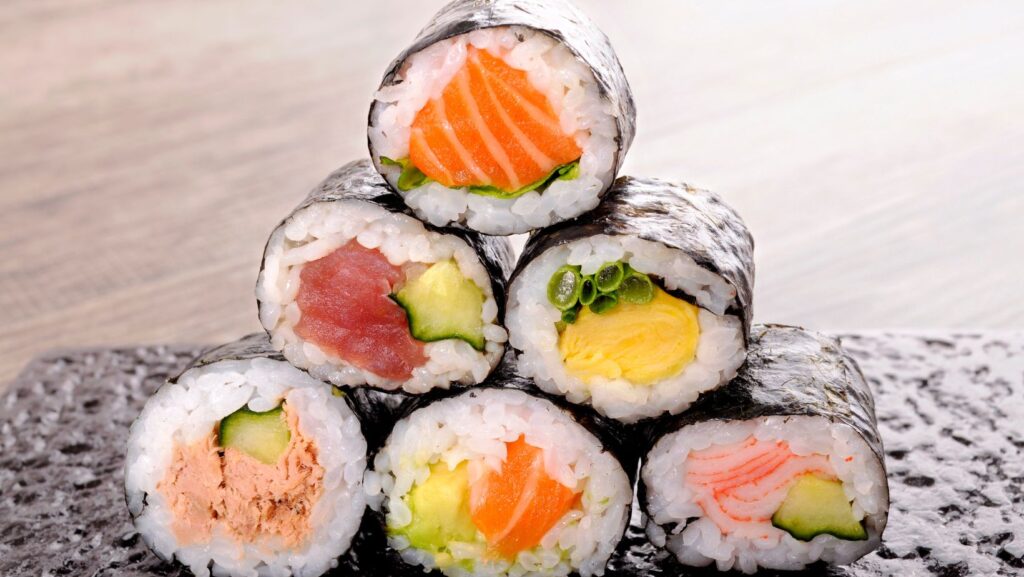Sushi rolls, a staple of Japanese cuisine, are enjoyed by millions across the globe. But beyond their tantalizing taste, what do we know about their nutritional value? This article aims to unravel the mystery behind the nutritional facts of sushi rolls.
From the protein-packed fish to the nutrient-rich seaweed wrap, sushi rolls are a flavorful fusion of health and taste. However, not all sushi rolls are created equal. Let’s dive into the intricate world of sushi roll nutrition, and discover what makes these bite-sized delights a healthy choice, or sometimes, a calorie bomb.
Delving deeper into sushi roll nutrition reveals an array of macronutrients and micronutrients that vary greatly depending on the types of sushi rolls examined.
Sushi Roll Nutrition Facts
 Examining sushi rolls from a caloric perspective, one discovers a range between 200 and 500 calories per roll. Variations largely correlate with ingredient choices. Moreover, macronutrients in sushi rolls also fluctuate. For example, a California roll typically contains around 9 grams of protein, 31 grams of carbohydrates, and 7 grams of fat. In comparison, a spicy tuna roll, made of different ingredients, contributes somewhere around 24 grams of protein, 27 grams of carbohydrates and 13 grams of fat to one’s diet.
Examining sushi rolls from a caloric perspective, one discovers a range between 200 and 500 calories per roll. Variations largely correlate with ingredient choices. Moreover, macronutrients in sushi rolls also fluctuate. For example, a California roll typically contains around 9 grams of protein, 31 grams of carbohydrates, and 7 grams of fat. In comparison, a spicy tuna roll, made of different ingredients, contributes somewhere around 24 grams of protein, 27 grams of carbohydrates and 13 grams of fat to one’s diet.
Indeed, understanding a sushi roll’s macronutrient profile advances awareness about the nutrition one absorbs.
Common Ingredients and Their Nutritional Value
Peek into a sushi roll and the multiple ingredients therein become evident. Japanese sticky rice, often modified to sushi rice using rice vinegar and small amounts of sugar, forms the base of most sushi rolls. This rice alone brings nearly 37 grams of carbohydrates and 4 grams of protein per 100 grams serving.
Protein content receives an uplift from the fish or seafood, commonly tuna or salmon, found in many sushi rolls. A standard serving of raw tuna offers almost 25 grams of protein. Additionally, consuming raw salmon introduces around 20 grams of protein and numerous, beneficial Omega-3 fatty acids.
Beyond rice and fish, sushi rolls often include a variety of vegetables such as cucumber and avocado. While cucumber is low in calories and nutrient-dense, avocado serves as a valuable source of healthy fats and fiber.
Lastly, the sushi roll’s exterior, often a seaweed wrap called Nori, adds little to the roll’s calorie content while providing a significant supply of iodine, necessary for proper thyroid function.
Conclusively, deconstructing the ingredients in sushi rolls facilitates a broader understanding of their nutritional values. It’s instrumental in making informed dietary decisions about incorporating sushi rolls into a wholesome, balanced diet.
Health Benefits of Eating Sushi
Appreciating the previous discourse on sushi roll nutrition facts, let’s examine the health benefits sushi brings to the table. This popular Japanese cuisine presents an array of nutritional advantages, primarily associated with its heart-healthy Omega-3 fatty acids, high-quality protein source, and bountiful supply of vitamins and minerals.
Omega-3 Fatty Acids
Sushi typically includes seafood—either raw or cooked—which is a natural source of Omega-3 fatty acids. Regular consumption of Omega-3 fatty acids promotes good heart health, evidenced by reliable studies citing a reduced risk of heart disease. The American Heart Association echoes this sentiment, suggesting two servings of fish per week for optimal heart health. For instance, one such sushi delicacy, the Salmon roll, tops the list with high Omega-3 levels, making it a heart-healthy choice.
High-Quality Protein
Sushi rolls count as a substantial source of high-quality protein. The core ingredients of sushi rolls, like fish and seafood, offer lean protein sources which aid in muscle growth and repair. To illustrate, the ‘Spicy Tuna Roll,’ runs high in protein, offering around 24 grams per roll. Protein, often referred to as a ‘building block’ for the bodily system, featured in sushi rolls contributes significantly towards meeting the daily recommended protein intake.
